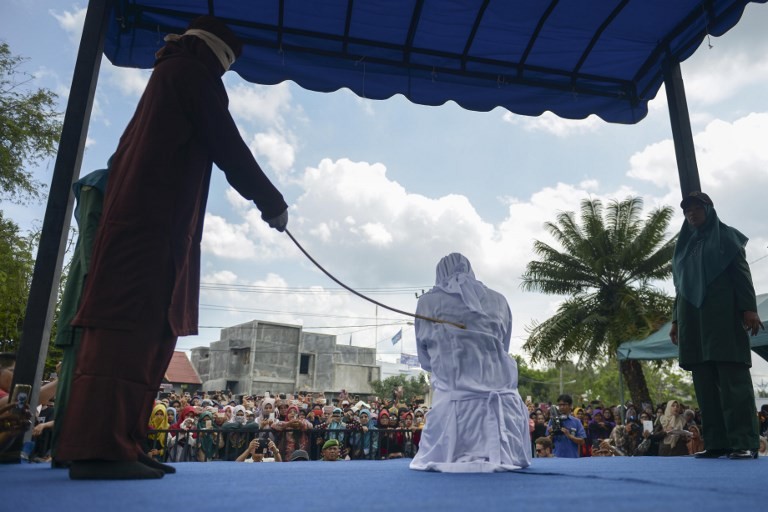Popular Reads
Top Results
Can't find what you're looking for?
View all search resultsPopular Reads
Top Results
Can't find what you're looking for?
View all search resultsWhy Aceh governor won’t be charged under sharia for his alleged crime
Social media was abuzz with netizens asking whether Irwandi Yusuf would be charged under sharia – in particular, whether his hands would be chopped off for corruption.
Change text size
Gift Premium Articles
to Anyone
 A woman is publicly flogged in front of a mosque in the provincial capital Banda Aceh on April 20, 2018. A group of amorous couples and prostitutes were publicly whipped for breaking Islamic law in Indonesia's Aceh province on April 20, just a week after it pledged to take the widely condemned practice indoors. (AFP/Chaideer Mahyuddin)
A woman is publicly flogged in front of a mosque in the provincial capital Banda Aceh on April 20, 2018. A group of amorous couples and prostitutes were publicly whipped for breaking Islamic law in Indonesia's Aceh province on April 20, just a week after it pledged to take the widely condemned practice indoors. (AFP/Chaideer Mahyuddin)
F
ollowing the arrest of Aceh Governor Irwandi Yusuf on Tuesday evening, social media was abuzz with netizens asking whether the former “freedom fighter” would be charged under sharia – in particular, whether his hands would be chopped off for corruption.
Under the 1999 law on Aceh’s special region status, coupled with the 2001 Special Autonomy Law for Aceh and Papua, Aceh is the only region in the country permitted to apply sharia.
What is punishment of stealing in islamic sharia law?
— Joe Tanjung🌈 (@JoeSuisTanjung) July 4, 2018
Under Islamic law, stealing or theft is punishable by amputating a hand. So, you might ask, genuinely or sarcastically, does that mean Irwandi’s hand will be cut off?
No, it won’t. Aceh does not apply full sharia.
Aceh’s sharia does not cover all crimes, only those related to Islamic morality such as zina (adultery and premarital sex), liwath (male homosexuality), musahaqah (female homosexuality) and qadzaf (false accusations of adultery).
The province still recognizes the Criminal Code (KUHP) as the law of the land. Non-Muslims can choose if they want to be charged under sharia or the KUHP for crimes that are regulated under both laws.
Non-Muslims found guilty of gambling, for instance, can choose to either be punished under the KUHP or under Aceh’s sharia.
While there appears to be a general tendency among the public to equate corruption with theft, they are separate crimes in the eyes of the law. Having said that, neither corruption or theft are regulated under sharia in Aceh, and hence fall under the jurisdiction of the KUHP or the 2001 Corruption Law.
Going sharia: A man stands in front of officers before being caned for gambling outside Al Munawaroh Mosque in Jantho, Aceh Besar regency, Aceh, on Friday. Despite being Buddhist, two people who were recently caught participating in cockfighting opted for caning as punishment instead of facing criminal charges. (Antara/Ampelsa)The Corruption Eradication Commission (KPK) has also confirmed that Irwandi will not be charged under sharia, but under the anti-corruption law.
At a conference press on Wednesday evening, KPK deputy chairwoman Basaria Panjaitan stated that legal proceedings against Irwandi would take place in Jakarta – meaning that he would be charged under the applicable laws of Jakarta.
A number of Muslim clerics in Aceh have long called for the hands of graft convicts to be cut off for their crime, on the grounds that corruption was rampant in the province and that there had been a long-standing perception that Aceh’s sharia was harsh only against the ordinary people while the elite were exempted from it.
This sentiment was echoed in a recent tweet from human rights activist Tunggal Pawestri:
Saya tahu banyak teman-teman yang jengkel, mengetahui bahwa hukum Syariah lebih sering 'menyasar' rakyat kecil ketimbang pejabat. Hal ini seeolah membenarkan adagium 'pisau tumpul ke atas dan tajam ke bawah'. Banyak orang jadi senewen. Tak pelak seruan potong tangan menjadi ramai
— Tunggal Pawestri (@tunggalp) July 5, 2018
"I know a lot of friends are upset, knowing that sharia often 'targets' the common folk instead of the rulers. This justifies the saying, 'a knife is dull against those above and sharp against those below'. Many people are nervous. No wonder that the call for chopping hands is loud," she posted.
In 2015, then-Aceh governor Zaini Abdullah ordered the province’s Sharia Agency to conduct a study on the possibility of caning graft convicts as punishment.
Agency head Syahrizal Abbas, an Islamic law professor, said that corruption, unlike adultery or theft, was not mentioned in either the Qur’an or the hadiths and therefore there was no clear punishment for it. However, he said that corruption was still a crime and that corruptors could be publicly flogged 100 times.
The proposal, however, met with opposition from some politicians who argued that the country already had a corruption law. Aceh lawmakers have taken no steps toward creating a qanun (legal stipulation) on corruption. (ahw)










